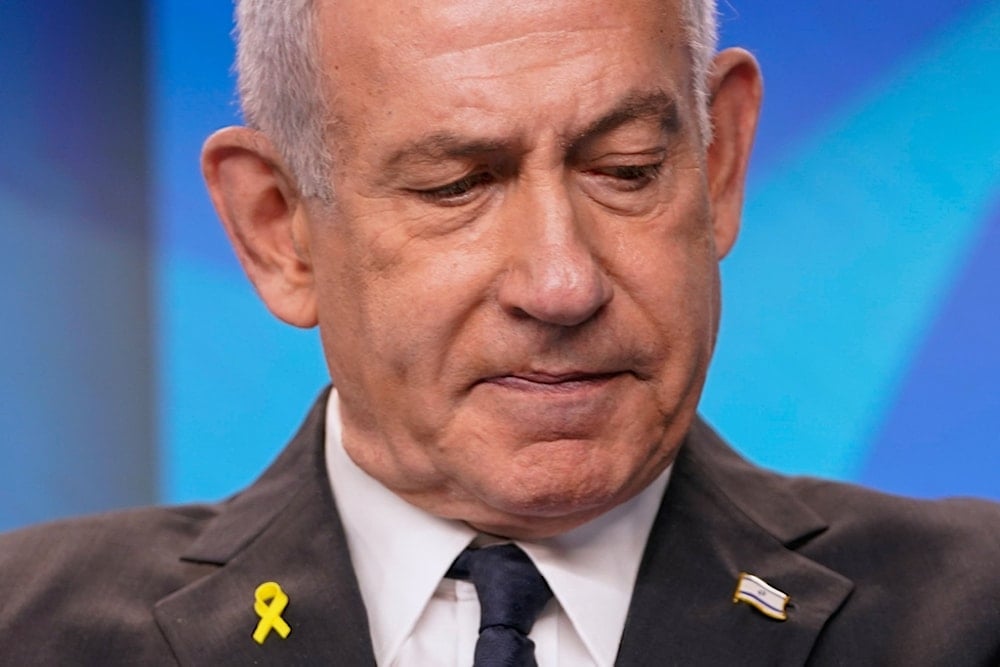Rifts deepen between Netanyahu and security chiefs over Gaza offensive
Benjamin Netanyahu faces growing backlash from "Israel’s" top security officials over the ongoing Gaza City offensive amid increasing tensions within the War Cabinet.
-

Israeli Prime Minister Benjamin Netanyahu at a joint press conference at the Israeli Prime Minister's Office, during Marco Rubio's visit, in Jerusalem, Monday, September 15, 2025 (Pool Photo via AP)
"Israel's" ongoing genocide in Gaza City is not only intensifying the suffering in the besieged enclave but also exposing deepening rifts between Israeli Prime Minister Benjamin Netanyahu and his top military and intelligence chiefs.
The internal discord comes at a critical moment, with "Israeli" forces pushing further into one of Hamas’s last urban strongholds.
Senior officials have voiced sharp opposition to Netanyahu’s decisions on three pivotal issues: the full takeover of Gaza City, targeted strikes on Hamas officials in Qatar, and the shift in his stance on ceasefire negotiations.
Critics say Netanyahu’s hard-line approach is not only isolating him internationally but also fracturing consensus within "Israel’s" War Cabinet.
Military leadership pushes back on Gaza City assault
Israeli Chief of Staff Eyal Zamir has privately and publicly resisted the decision to push into Gaza City. His concerns focus on the exhaustion of reserve forces and the prospect of the "Israeli" military being forced into the role of governing over two million Palestinians in the enclave.
Despite these warnings, "Israel" launched its offensive on the city this week, while hundreds of thousands of civilians remain under bombardment.
General Zamir, who was appointed by Netanyahu earlier this year, has so far chosen to remain in his post despite growing unease.
In a televised address, Zamir reiterated that defeating Hamas remains the stated objective but also stressed that recovering the remaining hostages is a “national and moral obligation.”
Read more: Zamir demands Gaza war strategy as rift with Israeli cabinet grows
Captives talks, Qatar strike spark more friction
Netanyahu has also overridden opposition from General Zamir and Mossad Chief David Barnea regarding the timing of a strike in Qatar. Both officials preferred to allow ceasefire negotiations to proceed, citing Qatar’s role as a key mediator and its close ties with the US.
Insiders familiar with the deliberations said that the decision bypassed broader military consensus and risked derailing ongoing negotiations aimed at securing a temporary truce and the phased release of hostages.
The War Cabinet, once seen as a body of collective decision-making, is now under scrutiny for appearing increasingly unilateral in its direction. Tzachi Hanegbi, Netanyahu’s national security adviser, joined Zamir and Barnea in backing a phased ceasefire deal that Hamas had reportedly accepted in principle.
Netanyahu, however, abruptly shifted to demanding a comprehensive agreement, a stance widely viewed as unrealistic and politically motivated.
Observers argue that Netanyahu’s approach marks a break from decades of "Israeli" governance, where military and political consensus was central to national security decisions.
Read more: Netanyahu stalls ceasefire deal as Hamas agrees, captives die: Lapid
Public distrust grows as humanitarian toll mounts
Public trust in Netanyahu’s leadership continues to erode, with many in "Israel" skeptical that the stated goal of eliminating Hamas is achievable. After nearly two years of war, the Gaza City offensive has raised further questions about strategic goals and human costs.
Polls suggest a majority of the "Israeli" public now favors a negotiated deal to end the war and bring hostages home, even if it means releasing Palestinian prisoners.
Meanwhile, the humanitarian situation in Gaza grows increasingly dire. Health officials in the enclave report that over 65,000 Palestinians have been killed since the war began, a number that includes both civilians and combatants. The assault has displaced over 350,000 from Gaza City, with an estimated half a million still trapped inside.
International pressure and accusations of war crimes
Netanyahu faces mounting international isolation. While he continues to enjoy support from the Trump administration, other global actors, including European allies, have condemned the "Israeli" campaign and warned of war crimes.
The International Criminal Court has accused Netanyahu of using starvation as a weapon and presiding over what some legal experts describe as acts of genocide, allegations the "Israeli" government firmly denies.
Internally, critics argue that Netanyahu is prolonging the war to maintain power and placate far-right elements within his coalition. The conflict, they say, has delayed any public reckoning for the intelligence failures that preceded the Palestinian-led October 7 operation.
About 20 captives are believed to still be alive in Gaza, along with the remains of up to 28 others.
With few dissenting voices in his government and little leverage from international actors, Netanyahu's increasingly isolated leadership faces one of its greatest internal tests to date.

 4 Min Read
4 Min Read










